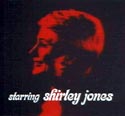
Starring Shirley Jones
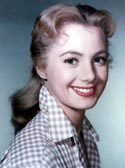
The early years
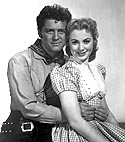
"Oklahoma!"
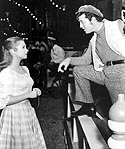
"Carousel"
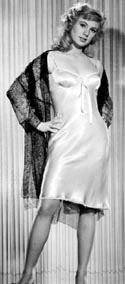
Shirley's Oscar-winning role in "Elmer Gantry"
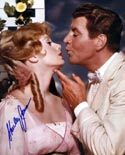
"The Music Man"
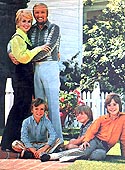
The Cassidys, early 1970s
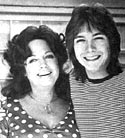
David and his Mom, Evelyn Ward
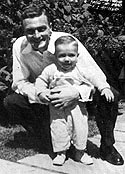
Jack and David, age 3
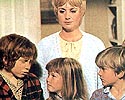
A new working experience
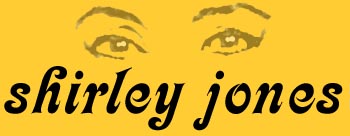
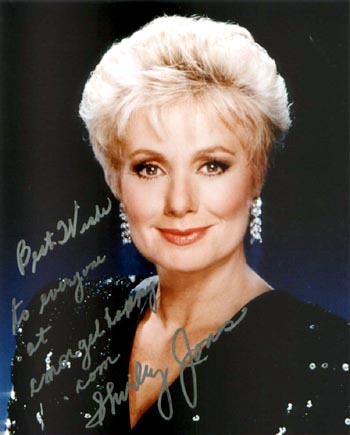 Discovered by musical legends Richard Rodgers and Oscar Hammerstein
II, Shirley Jones was signed to her first Broadway contract when she was
just 18 years old. She joined the chorus of South Pacific, but it
wasnít long before she was entertaining movie audiences with her roles
in Oklahoma!, Carousel, The Music Man, April Love, and Elmer
Gantry -- for which she won an Academy Award (for Best Supporting Actress)
for her performance as prostitute Lulu Baines. Shirley appeared on screen
with such motion picture heavyweights as Marlon Brando (Bedtime Story),
Jimmy Stewart (Two Rode Together), Henry Fonda (The Cheyenne
Social Club), Tony Randall (Fluffy), Glenn Ford (The Courtship
of Eddieís Father), Charlton Heston (Gideon), and James Cagney
(Never Steal Anything Small). But, she is best known to TV viewers
as the mom from The Partridge Family. The role was perfectly suited
to showcase her singing and acting talents, and allowed her to spend more
time at home with her family: the multi-hyphenate Jack Cassidy, and their
three sons, Shaun, Patrick and Ryan. Shirley has appeared in two dozen
feature films, countless TV movies, hundreds of TV guest roles, two television
series, numerous recordings, and in addition to winning her Oscar, has
been nominated for four Emmy Awards, 2 Golden Globe Awards (for The
Partridge Family), and is the recipient of countless Personal and Achievement
Awards. Shirley performs symphony concerts worldwide, and is currently
enjoying a resurgence in her TV career with roles on such series as The
Drew Carey Show, Sabrina the Teen-Age Witch and That 70ís
Show. Shirley is married to comedian Marty Ingels, and the couple lives
in Beverly Hills, CA.
Discovered by musical legends Richard Rodgers and Oscar Hammerstein
II, Shirley Jones was signed to her first Broadway contract when she was
just 18 years old. She joined the chorus of South Pacific, but it
wasnít long before she was entertaining movie audiences with her roles
in Oklahoma!, Carousel, The Music Man, April Love, and Elmer
Gantry -- for which she won an Academy Award (for Best Supporting Actress)
for her performance as prostitute Lulu Baines. Shirley appeared on screen
with such motion picture heavyweights as Marlon Brando (Bedtime Story),
Jimmy Stewart (Two Rode Together), Henry Fonda (The Cheyenne
Social Club), Tony Randall (Fluffy), Glenn Ford (The Courtship
of Eddieís Father), Charlton Heston (Gideon), and James Cagney
(Never Steal Anything Small). But, she is best known to TV viewers
as the mom from The Partridge Family. The role was perfectly suited
to showcase her singing and acting talents, and allowed her to spend more
time at home with her family: the multi-hyphenate Jack Cassidy, and their
three sons, Shaun, Patrick and Ryan. Shirley has appeared in two dozen
feature films, countless TV movies, hundreds of TV guest roles, two television
series, numerous recordings, and in addition to winning her Oscar, has
been nominated for four Emmy Awards, 2 Golden Globe Awards (for The
Partridge Family), and is the recipient of countless Personal and Achievement
Awards. Shirley performs symphony concerts worldwide, and is currently
enjoying a resurgence in her TV career with roles on such series as The
Drew Carey Show, Sabrina the Teen-Age Witch and That 70ís
Show. Shirley is married to comedian Marty Ingels, and the couple lives
in Beverly Hills, CA.
Shirley was gracious enough to spend countless hours reminiscing about her life and career with Scott Awley and cmongethappy.com in November 2000. Since we are celebrating the 30th Anniversary, Part 1 of our exclusive interview concentrates on The Partridge Family years. So sit back as Shirley takes us on our latest spin around San Pueblo!
GET HAPPY: In various interviews, youíve mentioned you switched from motion pictures to television in order to stay closer to home and family. But toward the end of the 60s, changing times forced Hollywood to make fewer of the musicals and lighthearted comedies that you were best known for. Were you finding it difficult to get work?
SHIRLEY JONES: Very definitely. Oh, sure, I was doing a lot of movies for television, but the big screen was not as easy. That was true. But everybody was finding it difficult, it wasnít just me. I was certainly at that age where it starts to dwindle down a little bit. But I really decided I wanted to stay home for a while.
GH: How did the salaries compare between movies and television?
SJ: Well, if you had a hit series, as I did, it was more consistent. But the salaries were nowhere near what they are today. But for that time, it was a very good salary if the series was a hit. You had a salary every week, whereas if you had a movie, itís one lump sum and then you wait for four, five, or six months and not work.
GH: How long were you away from home on an average shoot?
SJ: Movies were always done on location then. You rarely ever did a film in the studio. A musical went on forever. A musical would go on for six months to a year. A regular movie was usually two or three months. They took their time back then!
GH: When you switched from film to TV did you find the process the same ó or different?
SJ: I had done a lot of TV movies, so it was pretty much the same, shot with one camera. I had a problem with the 3-camera shoots because that was a very different experience. But with TV, the days were shorter and they were much quicker.
GH: When you were away shooting a film, how often did you get home? Or did Jack and the kids visit you on location?
SJ: I took my kids as much as I could. When they werenít in school I took them everywhere. They went on location with me to Europe. Once they started school, you couldnít just pull them out, so that was one of the reasons I decided to do TV at that point.
GH: What kind of daycare arrangements did you have for the kids if both you and Jack were working?
SJ: I had a live-in nanny. For Shaun, I had a nurse from the time he was born until he was about four or five. And with Patrick I had a woman for 20 years, which was great!
GH: How many other TV projects did you look at before choosing The Partridge Family?
SJ: Actually, I turned down television. I was not about to go into television. At that time it was a step down. Movie stars didnít do television. Now, of course, itís a different story.
GH: Was The Partridge Family the first script you looked at?
SJ: No, it was one of them. Actually, I had turned down The Brady Bunch first. I had seen a couple of other things that I had turned down too. I liked The Partridge Family because it had music in it and I felt it had a chance to succeed because it was different. The woman was one of the first working mothers without a husband ó which at that time I thought was a good step forward. It had an interesting idea and it had the music.
GH: Bernard Slade told us that at one point they had an idea of making Shirley Partridge divorced, but the higher-ups said "No!"
SJ: Oh, sure. At that time, they wouldnít do that. You had to have two people. But thatís what made the show so much fun because we were a normal family BUT we had that extra little cherry on the cake that made us interesting.
GH: The original name for your character was Connie. Do you know why that was changed?
SJ: Sure. They just wanted it to be "Shirley". They thought it was more identifiable. That was done a lot back then.
GH: What do you remember of the audition process, when the producers had finally narrowed the parts down between two separate sets of actors?
SJ: Well actually, I donít remember auditioning with everybody. I didnít audition for the part. It was offered to me. I remember meeting the different people when they felt they had somebody. The fact that I didnít even know David was being considered was interesting.
GH: Thatís very interesting, especially since you, David, and Jack all had the same manager, Ruth Aarons.
SJ: I think they were afraid to tell me. They didnít know what the relationship was. They wanted him but they wanted to make sure that everything was OK there.
GH: How did Jack wind up in the [unaired] pilot?
SJ: They just asked him if he would come and surprise me. They did that with Shaun too. Not in the pilot but in another show. He just walked on the set.
GH: The viewer wasnít provided with too much information on who or what Mr. Partridge was. Were you given any written information as a backstory for your character? Did you make a scenario up for yourself?
SJ: No, they didnít really say. They said he was a business man and we were happily married. He was a good father, husband, etc. ó the usual.
GH: In the pilot it was glossed over very quickly.
SJ: Right. So was the dog! She was practically gone by the second episode.
GH: What was your relationship like with David at this time? Did they have reasons to be concerned?
SJ: I didnít raise David. David lived with his mother. His father and mother were arch-enemies, unfortunately, for most of his life. It was the usual divorce thing, where she had to take him to court. When David was growing up, even though I spent time with him during the summer and on holidays, he was very withdrawn and reticent. I think he blamed me in the early years. I was like the evil stepmother, in a word. Therefore, maybe they thought we didnít like each other. Actually, we really grew to like each other a lot, but we grew to love each other as adults. That grew because he got a clear picture when he got to be of age.
GH: It was probably easier hanging around you every day on an adult level as opposed to a parental level or a step mother/step child level.
SJ: Exactly right.
GH: Did you have any say in which kids got cast in the parts?
SJ: No, not really. I left that up to them. I was not involved in that. I figured they did all the auditioning and reading and whatnot. They would have the better idea than I would. I was not an expert on child actors.
GH: Most of your feature work was with adults. Was it a difficult transition working with kids?
SJ: That was hard. The worst part of that is I was the last shot of the day, because they would have to get rid of the kids and the dog early. The very last close up would be without my actors. I would have to act to a camera and a script supervisor reading the lines. That was the worst part. At then end of the day it would be Dave Madden and me.